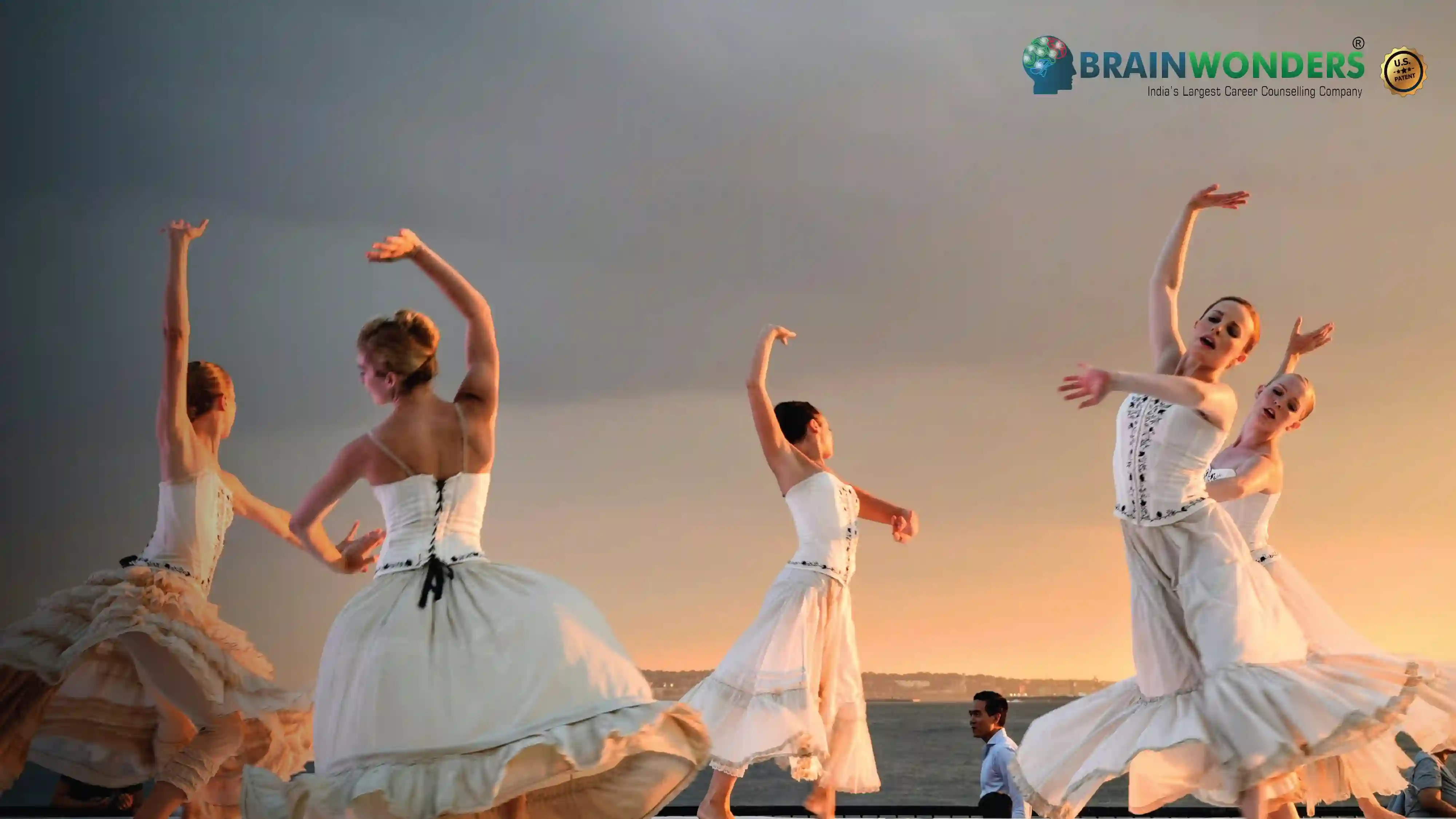How to become a Dancer
Overview, Courses, Exam, Colleges, Pathways, Salary

Overview
Who is Dancer ?
Dancers are performing artists who use body movement to express stories, ideas, and emotions. Through their dance performances, dancers combine aspects of rhythm and movement to portray a range of emotions, situations, and concepts to their audience. Their dance performances make use of lighting, costumes, narrations, props, and musical elements in addition to the dancers’ movements to craft a performance that captivates the audience and keeps them engaged. A dancer shall focus on only on the dance moves but also on the facial expressions, gestures to communicate through their performance.
There are different genres of dance that they can specialise in such as jazz, ballroom, hip-hop, contemporary, Zumba, tango, salsa, ballet, broadway, classical, ethnic, and folk to name a few. Professional dancers often excel in more than one style of dancing and can have the ability to sing and act as well, depending upon the particular style of dancing. It is a physically demanding job to be a dancer as they have to spend a great deal of time learning complex dance moves and rehearsing dance routines. Dancers can perform as solo artists or as a part of a group. They often require formal training in the dance form to be a professional dancer.
Typical day at work
What does Dancer do?
- Audition for various parts in dance productions to secure work opportunities
- Learn new dance moves and styles to keep oneself updated in the industry
- Attend events and shows to network with those in the industry and take part in promotional activities
- Rehearse dance routines to prepare for the performances
- Study and interpret the choreography to identify the facial expressions and gestures that best convey the concepts
- Learn the dance routines from the choreographer or dance instructor and make necessary improvements
- Work closely with the choreographers and fellow dancers to design or modify the dance routine as necessary
- Coordinate with the makeup artists, costume designers, musical directors, production directors, and the other cast and crew
- Practice own style of dancing regularly to maintain and improve technique
- Exercise regularly and follow a healthy lifestyle to ensure the physical stamina
Abilities and Aptitude needed
What are the skills, abilities & aptitude needed to become Dancer?
Dancers need to be highly committed to their art, exercising patience and perseverance throughout their careers. This job demands that the individual devote much of their time towards practising dance regularly in order to learn, develop, and perfect their skills. A dancer also needs to invest in keeping themselves fit and healthy as this profession requires considerable physical stamina in order to rehearse for long hours and deliver performances.
They should be equipped with excellent communication and listening skills in order to liaise effectively with the choreographers, directors, fellow dancers, and others. Their team working abilities are necessary as they frequently work in collaboration with other dance performers, actors, singers and others. Their spatial orientation and physical dexterity are essential in order to perform complex dance routines with grace. Time management and organisational skills are important for dancers to coordinate their activities with other professionals and deliver.
Salary
Salary for Dancer?
The income of a Dancer can vary significantly based on factors such as experience, expertise, reputation, type of performance (solo, group, stage, TV, film), and the dance industry they are involved in (classical, contemporary, folk, Bollywood, etc.).
- Minimum Monthly Income: The monthly income for budding dancers or those starting their careers can range from INR 10,000 to INR 30,000.
- Maximum Monthly Income: Established and renowned dancers who perform regularly in high-profile shows, films, and events can earn monthly incomes ranging from INR 50,000 to several lakhs.
- Annual Income: The annual income can range from INR 1,20,000 to several lakhs for experienced and successful dancers, including income from performances, teaching dance classes, workshops, endorsements, and brand collaborations.
- Highest Paying Job and Scope: The highest paying job for a Dancer is often as a lead performer or choreographer in prestigious dance companies, stage productions, Bollywood films, or popular dance reality shows.The scope for Dancers in India is diverse, with opportunities in various dance forms, including classical, contemporary, folk, and Bollywood dance. Talented dancers can perform at national and international events, collaborate with famous artists, and participate in dance competitions and TV shows. Additionally, successful dancers can venture into choreography, teaching dance classes, conducting workshops, and endorsing dance-related brands.
Pathways
How to become an Dancer?
Entrance Exam
Entrance Exam for Dancer ?
Courses
Which course I can pursue?
Best Colleges
Which are the best colleges to attend to become an Dancer?
Industries
Which Industries are open for Dancer?
Dancers can explore various industries and settings where their skills and talents are in demand. While many dancers pursue careers in the performing arts, several industries offer opportunities for dancers to showcase their artistry and creativity. Some of the industries open for dancers include:
- Performing Arts Companies: Dancers can work with professional dance companies specializing in various genres, including classical, contemporary, ballet, modern, and jazz.
- Entertainment and Media: Dancers can find opportunities in the entertainment industry, including live performances in concerts, music videos, television shows, and movies.
- Stage Productions and Theater: Dancers can perform in stage productions, musicals, and theater performances, collaborating with actors, singers, and other artists.
- Dance Studios: Dance studios and schools offer teaching and choreography opportunities for dancers to share their expertise with students of different age groups & dance levels.
- Theme Parks and Cruise Ships: Theme parks and cruise lines often feature dance performances as part of their entertainment offerings, providing opportunities for dancers to perform in unique and diverse settings.
- Fashion and Commercial Events: Dancers may participate in fashion shows, product launches, corporate events, and commercial performances, adding artistic flair to these events.
- Dance Festivals and Events: Dancers can participate in dance festivals and events celebrating various dance styles and cultures.
- Corporate and Cultural Events: Dancers may be hired for corporate events, cultural festivals, and community celebrations.
- Educational Institutions: Dance schools, colleges, and universities often employ dancers as instructors or choreographers.
- Fitness and Wellness: Dancers with expertise in specific dance styles, such as Zumba, fitness dance, or yoga dance, can find opportunities in the fitness and wellness industry.
- Circus and Acrobatic Shows: Some dancers with acrobatic or contortionist skills may be employed in circus and acrobatic performances.
- Virtual and Online Platforms: With the rise of digital media, dancers can create content for online platforms, such as dance tutorials, performances, and collaborations.
internship
Are there internships available for Dancer?
Internships for dancers can be valuable opportunities to gain practical experience, improve skills, and build connections within the dance industry. While formal internships may not be as common as in some other fields, there are still several ways dancers can seek internships or similar experiences:
- Dance Companies: Both classical and contemporary professional dance companies may offer internship or apprentice programs. Interns may have the chance to observe rehearsals, participate in classes, and even perform in smaller productions.
- Dance Studios: Local dance studios may provide internship opportunities for dancers interested in teaching, choreography, or assisting with classes and events.
- Dance Festivals and Workshops: Dance festivals and workshops often welcome volunteers and interns to help with event logistics, organization, or technical support. It can provide exposure to various dance styles and networking opportunities.
- Dance Schools/Colleges: Dance schools and colleges with dance programs may have internship options for students to gain teaching experience or assist with productions.
- Theater and Performing Arts Centers: Theaters and performing arts centers may offer internships for dancers to work on productions and collaborate with other artists.
- Cultural and Community Events: Interning at cultural events, dance festivals, or community dance projects can offer experience in public performances and community engagement.
- Choreographers and Dance Artists: Aspiring dancers can also approach choreographers and established dance artists to inquire about opportunities to work as interns or assistants.
- Dance Education Organizations: Dance education organizations may offer internships related to dance education, curriculum development, or outreach programs.
Career outlook
What does the future look like for Dancer?
Dancers deliver performances for television, commercials, motion pictures, internet productions, music videos, theatre productions and more. This also includes performing at dance recitals, plays, musical comedies, operas, corporate events, cruise ships, and ceremonial events. With ample experience in the field, dancers often move towards choreography, dance administration, dance journalism, directing, and teaching dance or even dance movement therapy. They can work in dance schools, dance companies, conservatories, dance studios, and theatres as well. Some professional dancers prefer to work as freelancers and are self-employed.
They do not typically have a regular nine to five schedule, as most dance practice sessions are in the daytime while the performances are in the evenings or on weekends. Dancers may be compelled to travel on occasion depending on their employer. Continued learning for professional development is necessary for dancers to maintain their skills and to stay updated with the current trends.




.webp)
.webp)
